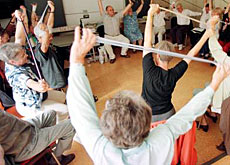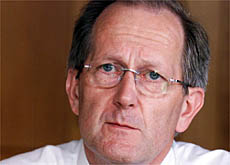Population getting older but healthier

The Swiss population is getting older but its health care needs in years to come will be lower than expected.
A new study shows that the share of elderly people requiring medical care should drop thanks to better prevention and medical treatments.
Currently, up to 126,000 people – or 11.4 per cent of the population over the age of 64 – are not able to care for themselves in Switzerland.
Previous demographic studies suggested that the number could soar to 172,000 by 2020.
But the latest survey by the Swiss Health Observatory in Neuchâtel shows the figure should not rise above 150,000, thanks to medical advances and preventative measures.
“People are also benefiting from better living conditions, social protection and a less strenuous working environment,” Valérie Hugentobler, one of report’s authors, told swissinfo.
Improved treatment for senile dementia, for instance, could lead to 20,000 fewer people a year requiring medical care by 2030.
Hugentobler added that early detection and prevention could also delay the onset and development of this type of disease.
Prevention
The study’s authors add that prevention is key to keeping numbers of elderly patients down.
Simple measures such as visiting the elderly in their homes mean that problems involving hygiene and nutrition can be picked up quickly.
But Christian Lalive d’Epinay, a sociologist and the founder of Geneva University’s gerontology institute, warns that better health among the elderly does not necessarily mean good health.
“It’s a myth to believe that you can live a long, healthy life and suddenly die,” he told swissinfo. “The older you get, the more fragile you are.”
Lalive d’Epinay says nearly half of all people over the age of 80 are dependent on fulltime health care in Switzerland. Around a quarter of the population between 60 and 65 suffers from fragile health, he adds.
Healthcare costs
The aim of the study was to consider the impact of an aging population on Switzerland’s health care structure.
The cost of health care is among the thorniest issues faced by Switzerland’s politicians.
According to the Organisation for Economic Cooperation and Development, Switzerland is the country that spends the biggest share of its gross domestic product – nearly 11 per cent – on healthcare after the United States.
Peter Meyer, the head of the Observatory, points out that fewer elderly people receiving medical care will not automatically lead to lower insurance premiums for Swiss households.
“The demographic effect on health costs has been overstated,” he told swissinfo. “Personnel costs have by far the biggest influence.”
However, the Swiss health care system will have to tackle to increased demands in years to come, according to the report.
“Switzerland’s health care structure will have to adapt,” says François Höpflinger, one of the study’s authors. “Current medical practices will have to give way to long-term, out-patient health care.”
The Observatory says authorities will have to review the financing of health care for the aged. It is due to publish its own proposals early next year.
swissinfo, Scott Capper
Up to 126,000 people over the age of 64 cannot care for themselves in Switzerland.
Previous estimates suggested this number could reach over 170,000 by 2020.
A new study says better medical treatments and prevention could mean only 150,000 people may be in this situation.

In compliance with the JTI standards
More: SWI swissinfo.ch certified by the Journalism Trust Initiative











You can find an overview of ongoing debates with our journalists here . Please join us!
If you want to start a conversation about a topic raised in this article or want to report factual errors, email us at english@swissinfo.ch.